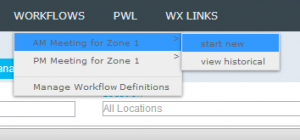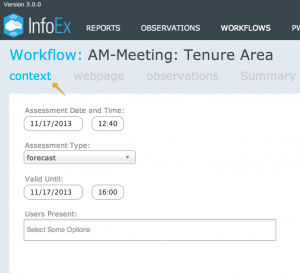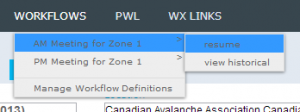|
|
| Line 30: |
Line 30: |
| | | | |
| | ===Completing the steps included in the workflow=== | | ===Completing the steps included in the workflow=== |
| − | {{Note|Once a workflow has been initiated, you do not need to be online for completing the data entry steps. However, you need to be online to view any external webpages or InfoEx reports that are part of your workflow.}} | + | {{Note|Once a workflow has been started, you do not need to be online for completing the data entry steps. However, you need to be online to view any external webpages or InfoEx reports that are part of your workflow.}} |
| | | | |
| | {|class="TblSteps" | | {|class="TblSteps" |
Revision as of 12:17, 31 December 2013
| REQUIREMENTS |
| Permission |
Submission Moderator and higher |
| Connectivity |
Online and offline |
This document describes how to execute a workflow instance from an existing workflow template during regular operations.
Background
A workflow links together user-specified tasks into a logical order so that users can repeatedly move through the same steps. See the following documents for more background information on workflows:
Executing a workflow instance involves three main steps:
- Starting the desired workflow
- Completing the steps included in the workflow
- Saving the results of a workflow and sharing them with the InfoEx community
Step-by-step description
Starting the desired workflow
| 1.
|
 Fig. 1: Workflow menu for starting a new workflow instance.
| NOTE |
It is desirable to have a live internet connection when you initiate a workflow. This allows the system to pre-populate the fields of the Snowpack module, Hazard assessment module and Hazard comment module with the information from the last time a workflow was submitted for the location(s) associated with the chosen workflow. |
| NOTE |
It is possible to initiate a workflow instance completely offline, but it will be completely empty and you will have to start your assessments completely from scratch. |
|
| 2.
|
 Fig. 2: Workflow progress |
Completing the steps included in the workflow
| NOTE |
Once a workflow has been started, you do not need to be online for completing the data entry steps. However, you need to be online to view any external webpages or InfoEx reports that are part of your workflow. |
| 1.
|
Complete the first step of the workflow as described in the relevant workflow module help document. See Workflow modules for more information on the functionality of individual workflow modules.
|
| 2.
|
 Fig. 3: Workflow controls
| NOTE |
Once a workflow step has been completed, the workflow step label will be turned into a hyperlink and you can always directly go back to this step by clicking on its label. |
|
| 3.
|
At any time during your workflow, you can click on the Discard & Exit button from the workflow controls (Fig. 3) to exit the workflow and delete all of the information that has been entered.
|
| 7.
|
 Fig. 4: Workflow menu for continuing an existing workflow instance.
| NOTE |
The information of a partially completed workflow is only stored on the computer where the workflow was started. This information is 'not stored on the InfoEx server or shared among the computers of the same operation. |
The continue this particular workflow, click on the WORKFLOWS menu, select the particular workflow template and click on 'resume' (Fig. 4).
|
Saving the results of a workflow and sharing them with the InfoEx community
| 1.
|
Any workflow that includes a workflow module with data submission (click here for list of workflow modules with data entry), automatically has a summary step included at the end of the workflow.
|
| 7.
|
At any time you can select Save & Exit from the workflow controls (see Figure 2) this will save a local copy of the workflow execution to date as well as share the saved information between all enabled local computers within an operation. However, no information will be shared with the infoEx server.
|
| 8.
|
When the Submit button activates by turning blue Submit you may submit all entered information to the infoEx Server
| NOTE |
Once information is submitted to the infoEx server it will be deleted from all local computers. You may review previously submitted workflows. See: Viewing previously completed workflows |
.
|
Related documents
Functionality tested by
- Dec. 31, 2013: Pascal Haegeli


